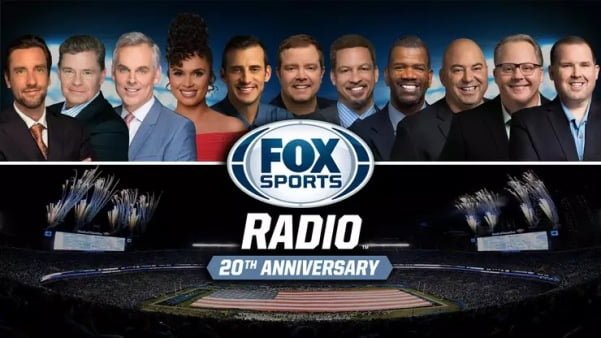To look back on FOX Sports Radio’s history with a view from 30,000 feet above, it’s hard to imagine that the network could have failed when it launched in August 2000. It was the brainchild of Premier Networks, the undisputed leader of talk radio syndication, and it had nationwide support from Clear Channel, the largest station owner in the world.
Sitting here 20 years later, it’s still hard to imagine a scenario where a collapse could’ve happened, but sustaining success for such a long period of time is noteworthy. That’s a testament to great teamwork, support, talent, and an understanding of the importance of evolving. Now in its 20th year of operation, FSR is clicking on all cylinders, and as good as it has ever been.
“In our audio world, we look for the best story tellers and entertainers. It doesn’t matter to Premiere whether it is Sports, Talk, Music or any other audio format, we are going to continue to work to have the most influential talent in any format,” Premier Networks President Julie Talbott told me in an email. “Our Fox Sports lineup is the best, and they are the top influencers.”
Led by names like Dan Patrick and Colin Cowherd, the FOX Sports Radio weekday lineup offers the same kind of star power for sports fans that Premiere’s news/talk lineup of Glenn Beck, Rush Limbaugh, and Sean Hannity offers to conservative political junkies. But the network didn’t reach this point without a stubbed toe or two along the way.
THE BIRTH OF A NETWORK
Ray De La Garza was the Director of Programming for Premier Radio Networks in 1998. In the summer of that year, he put together a proposal.
“I created the original Fox Sports Radio proposal of ‘NO Play-by-Play just great entertaining Sports Talk’ and presented it to Kevin Spivak from News Corp and Michael Milken who were major investors at Premiere Radio Networks,” De La Garza wrote in a Facebook post. “They had an office with us on our 4th floor.”

Spivak and Milken loved the concept. They set up a meeting between De La Garza and the top programming executives at FOX Sports Net, Arthur Smith and Jeff Shell. Premier Chairman and CEO Steve Lehman was also in that meeting.
Gabe Hobbs was the Senior Vice President of News/Talk and Sports at Clear Channel in 2000. He told me that the company owned near 80 sports stations across the country at the time, and found ESPN was “getting a little difficult to deal with as the only brand game in town.”
Meanwhile, FOX had become an established force in the sports world on network television. Hobbs said much of its success on TV was the result of innovation. David Hill had come to the United States after revolutionizing the way soccer was presented on TV in England. FOX drew several snickers and jeers when Hill was hired to oversee the network’s presentation of NFL football, but he created what would become the standard for the sport’s television presentation.
FOX Television may not have been interested in running their own network, but Tom Lee, FOX Sports Radio’s original Director of Programming told me that FOX TV’s fingerprints were all over the radio network. He wanted listeners to never forget the two entities were linked.
“We identified the personalities from each sport and began slotting them in to our daily shows, featuring FOX TV talent as show hosts, guests and contributors, Lee said. “We also used the branded FOX sports theme music, highlighting the NFL, MLB and college football themes throughout our production elements. We used the same Imaging voice, Dick Ervasti, that FOX used on all of their major sports platforms. Developing that synergy with the network was a key factor in establishing the credibility we needed for a new network. We based our weekend programming at the FOX TV lot on Pico Blvd. in LA in order to have access to the high profile personalities that FOX had on site during the NFL and college football seasons. We also added several of the FOX TV MLB and NASCAR analysts to our lineup.”
To make an impact on the industry, Hobbs decided to exploit one of his biggest competitor’s blindspots at one of the sports radio world’s biggest annual events at the time.
“I remember being at Rick Scott’s sports convention in Phoenix that year. ESPN was always a great sponsor for Rick but they had never thought to ask for exclusivity. Why would they? So we bought up every sponsorship that was available and had an army of folks at the convention like myself, Greg Noack, Kraig, and others. ESPN was shocked I think.”
But if FOX Sports Radio was going to be a dominant player in national syndication, it needed a marquee talent.
De La Garza got FOX Sports Net executives to buy into the idea that a national sports radio network could work without play-by-play. “Those rights were very expensive and unnecessary,” he wrote on Facebook. That would only be true though if the hosts were big names with strong opinions.
Enter Tony Bruno.
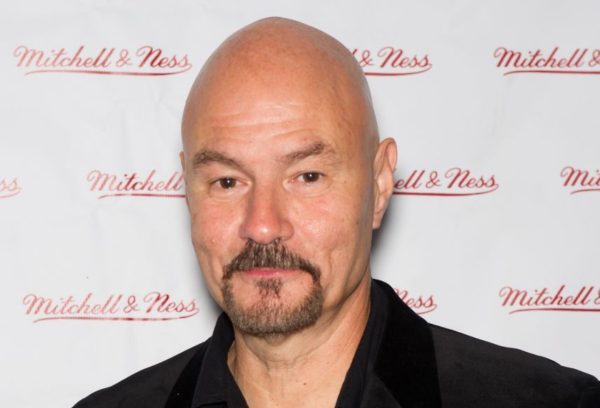
“Tony was the signature voice of Fox Sports Radio when the network launched in 2000,” added Lee. “He was already established as one of the most relevant and respected voices in the sports talk industry. Kraig Kitchin, the President of Premiere, recognized the importance of his star quality, and signed Tony to anchor our Morning Drive Program. He was the first voice our listeners heard every day and that was huge.”
Bruno told BSM’s Brandon Contes that he was trying to figure out his next career move when he got the call from Kitchin. Bruno had left ESPN Radio at the end of 1999, and Kitchin wanted him to leave the East Coast for LA, where the new network would be headquartered.
“I agreed to fly out for a visit, and Kraig convinced me it would be awesome if I could be the first voice to launch FSR after being the first voice to launch ESPN in 1992 on weekends with Chuck Wilson and Keith Olbermann,” Bruno shared.
The first actual voice to appear on the network was Larry ‘Smokey’ Gifford. The current Director of talk radio for Corus entertainment in Canada, worked part-time as an update anchor before being elevated six months in to Sports Director. He delivered a national update leading into Bruno’s first show. Tony at the time had been doing his show for a few weeks for Tampa and Los Angeles, but when the lineup went live across the country, ‘Smokey’ uttered the first word.
With Bruno installed in mornings, the network needed other pieces round out the lineup and surround their morning star. Andrew Siciliano, JT The Brick, Kevin Kiley, Chuck Booms, Steve Czaban, Bob Golic, Rich Herrera, Dan Sileo, Bob Page, Kevin Frazier, Jeanne Zelasko, and Steve Lyons were some of the notable voices who were part of FSR’s early days. Sileo passed along a tweet which showed the network’s lineup on Day 1. Larry Gifford remembers some of the growing pains from that time.
“Our main studios were at Premiere Radio Networks in Los Angeles. The old Denny’s (smelled like bacon in the studio for six months) had not yet been fully converted into our new street level studios,” recalled Gifford. “It was a whirlwind. Shows were battling each other for guests. Update anchors cut their own audio, but we didn’t have access to ESPN, the AP or CBS ABC NBC or even Fox Sports, because the name was leased to Premiere Radio and the relationship hadn’t been formulated yet, and Fox Sports didn’t have a cut service like ABC did. We had lineup changes seemingly every other month with shows coming and going. I believe every show experienced personality or producer changes during the first six months.”
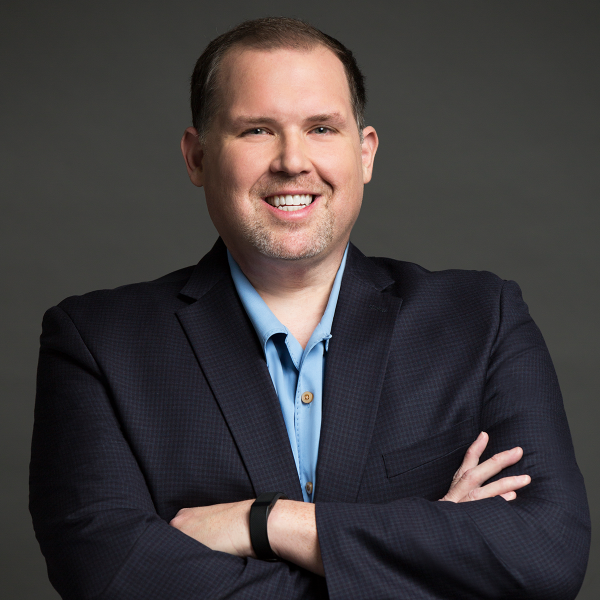
Another addition to the roster shortly after the network launched as an update anchor and weekend host was Ben Maller. The current king of the overnights for FSR told Brandon Contes that consistency in quality may have been hard to find at first, but it’s been a big part of the network’s success over the years.
“I’m a big believer that a chain is only as strong as its weakest link. It’s a team effort at FOX Sports Radio from management, on-air, behind the scenes support staff. All of the above. Tony Bruno launched the network and got us heading in the right direction, and others have carried the baton over the years on FSR.”
But while the present days of FOX are drastically different than what the initial crew endured in 2000, there’s something to be said for working at a network when everyone is trying to find their way and create exciting and memorable moments. Unfortunately for Gifford, that meant having to execute with noticeable distractions nearby.
“I don’t think anybody realized that our overnight show was morning drive out east until we had already launched with Golic and Herrera,” said Gifford. “That was a crazy show. There was a stripper one night in the control room while I was reading an update. That will test your focus while reading updates on a national network.”
Although delivering updates with strippers in the control room might not have been in the job description, there was no denying that a different type of presentation was being introduced to sports radio listeners. As Gifford told me in an email, the network’s shows were distinctly different than what was offered on ESPN Radio. It was more locker room, less press box. More outrage, speculation, hypothesis and entertaining guy talk, and less journalism, storytelling and context.
“We were just trying to get a piece of the ESPN radio pie” Gifford added. “We were West Coast focused, West Coast-based, and we catered to West Coast sports fans for the most part. We started with the tagline, ‘sports talk with attitude‘, but by the end of the first year we realized we didn’t need to tell people we were sports with attitude, what we needed was to be sports talk with attitude.”
WELCOME TO THE JUNGLE
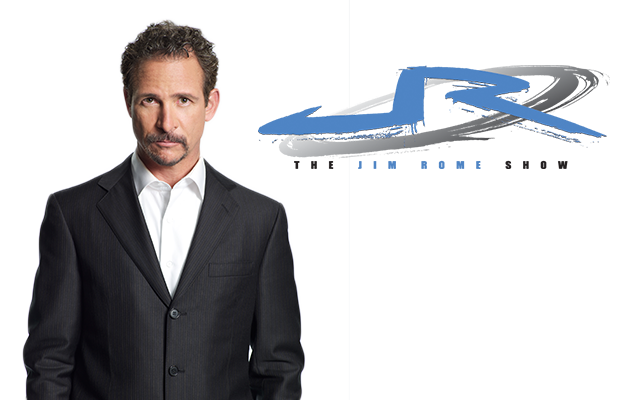
If there was any personality that delivered attitude thru the speakers it was Jim Rome. Rome was never officially an employee of the network. His show was syndicated by Premiere, the syndication company which distributed FOX Sports Radio’s programming. But with Clear Channel behind the brand, and FOX looking to claim their share of sports radio ratings and revenue, Rome’s program was a critical component.
“Fox Sports Radio created 21 hours of live sports talk programming during the weekdays, and 24 hours each weekend day,” Premiere co-founder and former President Kraig Kitchin told me. “It was a purposeful programming schedule design, allowing the radio stations airing the Jim Rome Show to continue doing so without interruption.”
Rome had been in syndication for four years when FSR launched. Kitchin says the show wasn’t used as a model for the new network’s programming since Rome was too unique of a talent to successfully copy.
“Jim Rome’s program is unique in many ways, one of them being a single host presentation without any network affiliation. It allowed Jim to be himself, be declarative with his takes and develop a relationship with his listeners that was often about sports, rivalries between cities and teams and fan following and themselves.”
The network did have something to learn from Jim Rome. It just wouldn’t be on the programming side.
“FOX Sports Radio’s marketing efforts did learn from the marketing of Jim Rome’s program,” Kitchin said. “The affiliation sales team emphasized the ratings draw of the personalities, and not just to rely on the brand of FOX Sports, as strong as it is and was. We emphasized the talents of Tony Bruno, of Andrew Siciliano, of Dan Sileo, of Chris Myers, of Steve Mason and John Ireland, of Kevin Frazier and Jeannie Zelasko and the others that made the conversations on Fox Sports Radio so compelling.”
With Bruno installed in mornings, and the Rome phenomenon growing due to Jim’s passionate takes, unique style, fiery phone callers, Smack-Off’s, and tour stops across the country which sold out arenas, FOX began to build buzz and cement itself as a significant player in the national sports radio space. The next challenge was to expand the network’s reach and to do so, the network felt it needed a natural born leader with high energy, passion, a strong track record, and unwavering confidence.
ENTER ANDREW ASHWOOD
Three years after launching, FOX Sports Radio hired Andrew Ashwood. The network’s Vice President and GM came to Los Angeles from San Antonio where he was running the Ticket 760 and News Radio 1200 WOAI. The roles were significant, because San Antonio was the home of Clear Channel’s corporate headquarters.
Ashwood brought a new motto, fresh vision, big personality, and great radio instincts with him to the network. His “Dare To Be Great,” was something many embraced and carried forward during his time in charge.
“Andrew accepted the challenge in a time of budget restraints, growing competition and more and more sports stations relying on local programming,” said Gabe Hobbs, who offered Ashwood the network position. “But he went into the project like a bull in a china shop wearing fur boots! He quickly realigned the staff and the place went from 7 or 8 islands everyday to a unified staff that actually liked each other and rooted for each other. The secondary mantra to ‘Dare to be Great’ was probably ‘Work hard – play hard.’ And we did.”
Tasked with continuing to improve the programming and grow the network’s presence, Ashwood dove right in, helping FSR triple its affiliates. It was almost certain he would have been in the driver’s seat at the network much longer than just five years if not for a heart attack that took his life on November 13, 2008.
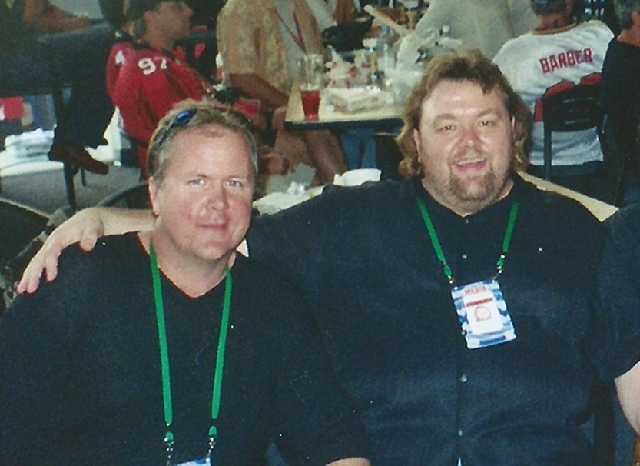
Jon ‘JT The Brick’ Tournour
It was a moment that sucked all of the life out of the room in Los Angeles according to Jorge Sedano, who Ashwood hired to do overnights for the network in 2004.
“Of all the people I’ve worked for or with at any stop, Ashwood was the greatest connector, he was incredible at that,” Sedano told BSM’s Brandon Contes. “When I arrived at FOX Sports Radio, it was on the brink of shuttering and Andrew Ashwood is the reason Clear Channel stuck with it. Kraig Kitchin, who was the President of Premiere Radio Networks was ready to just keep Bruno, Rome & JT The Brick and syndicate them. When Clear Channel pegged Andrew to resuscitate FOX Sports Radio, it was the last stand and to his credit – his vision made it work. He literally saved FOX Sports Radio. After Ashwood passed, FOX Sports Radio lost some of their identity.”
One personality who was especially close to Ashwood was JT The Brick. The loss of his mentor hit him hard, motivating JT to make sure others knew how important Ashwood was. He wrote a book ‘The Handoff’ which captured his friendship, loyalty, and love for the man he referred to as his mentor.
In an interview with the Las Vegas Review-Journal in 2013, Brick told the newspaper “Andrew was the reason all this happened, the doors he opened for me. He was the reason I met my wife (Julie), the reason I came to work for the Raiders, the reason I’m at Fox Sports Radio. I believe in fate, and that one phone call in the middle of the night from a Miami program director changed my life. He was my guardian angel. He knew what he meant to me. I want more than anything for people to pick up this book and say, ‘Wow, I wish I could have met this guy Andrew Ashwood.’ I want his name to live on forever.”
This story would be easy story to write if FOX Sports Radio’s path to success was as simple as “launch, wait, profit!” but Ashwood’s death is proof that the road to greatness sometimes involves taking detours and getting lost.
As was to be expected with a growing network, FOX had undergone a few lineup changes during it’s first 8 years. Tony Bruno left after he and the network couldn’t agree on a new contract (Tony would return years later to host a night show on the network). The combination of Van Earl Wright and Andrew Siciliano that followed wasn’t well received, and that paved the way for Steve Czaban to move into morning drive.
But from a corporate standpoint, constant change doesn’t inspire confidence. With Ashwood no longer around to lead the charge, there were questions about FOX’s future. Premiere’s current Senior Vice President of Sports Programming Don Martin told me, he thought the network could be shut down entirely.
PAGING DON MARTIN
It was January 20, 2009, a historic day for the United States. While many were celebrating Inauguration Day for the country’s first Black president, inside the walls of Clear Channel it was grimly referred to as “Black Tuesday,” as the company merged the operations of AM 570 in Los Angeles and FOX Sports Radio. That meant there were more than a few layoffs.
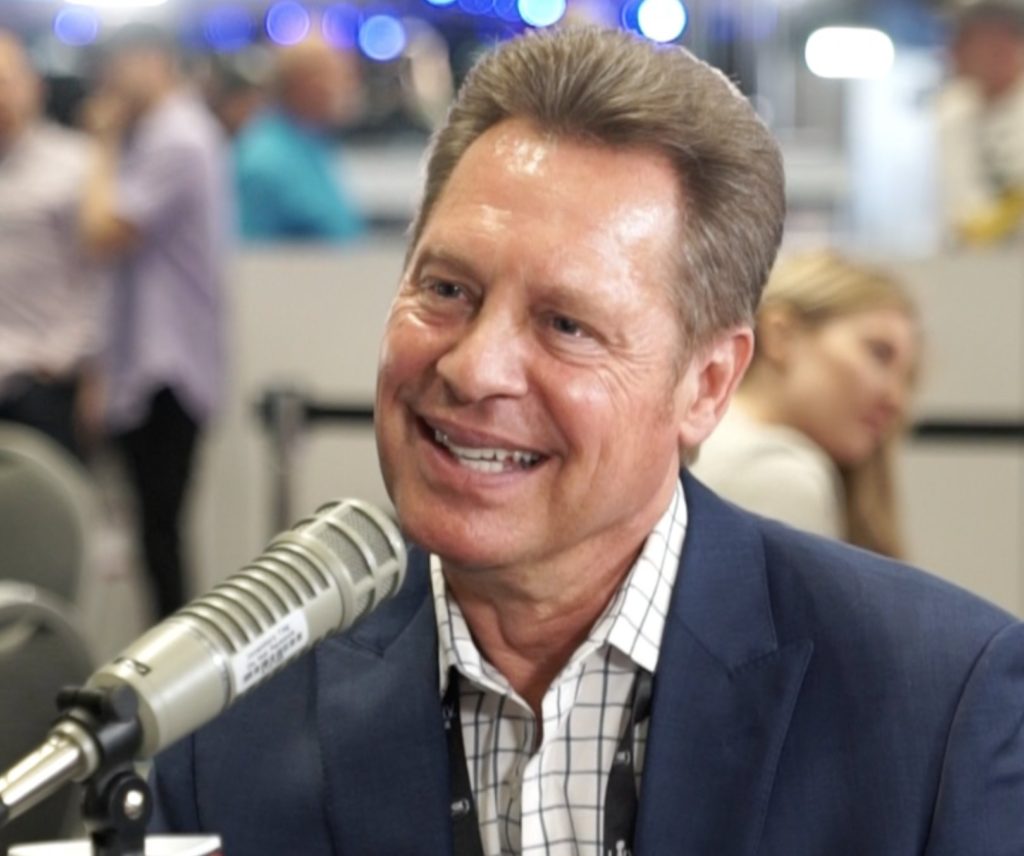
Martin had just taken over operations of FOX Sports Radio, and it was time to renew the licensing agreement with FOX. Except there was a big problem. Martin heard from friends at the FOX lot that David Hill wasn’t interested in renewing the deal.
“No one really quite knew what was going to happen with FOX Sports Radio. There were a lot of rumors, a LOT of rumors” Martin told me by phone. “We work in the media. There are always people talking, but I just kept hearing ‘No, David Hill’s not gonna re-up it. It’s not making sense.'”
Fortunately for Martin and the FOX Sports Radio staff, FOX television wanted to enter into a co-production. One morning while a TV crew was working on a pilot for The Best Damn Sports Radio Show Period to replace the recently cancelled television version of the show.
Martin said the setup looked nuts by sports radio/simulcast standards. He went into the studio multiple times to poke fun at George Greenberg, who was FSN’s Vice President of Programming and Production at the time. Martin told George that the set up was too costly to generate a profit, and noticed a small man in a baseball cap with his head down on the table before he left each time.
Then, the last time Martin turned to leave, the man in the baseball cap asked for a moment of his time.
“George introduces me to him. ‘This is David Hill.’ It was the first time I had ever met him. So he came and sat in my office with me and we chatted for, my gosh, a couple of hours. Then we had two, three, four meetings after that.”
Every aspect of radio was discussed with Hill. David was adamant that all sports talk radio across the country was the same, and his description of the format was “take any older white guy and just change the name of the city.” But Hill was invested in the conversation with Martin, and relayed an opinion that gave FOX’s new head of programming a reason to think that maybe Hill wasn’t ready to pull the plug after all.
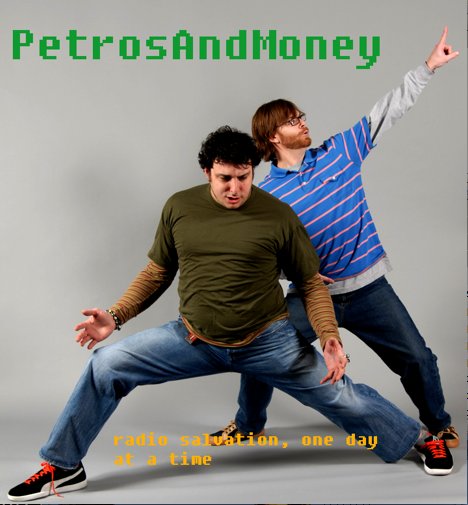
“He said ‘Petros and Money are different,'” Martin told me. The duo was in afternoon drive on the West Coast for the network at that time. They’re now heard weekdays on AM 570 LA Sports.
“We had this long conversation about how ESPN were reporters and they were very good at it. They had the biggest names and reporters in the country. We said ‘You know what? We have a choice. We can either be ESPN Lite and kind of do what they do or cut our own lane.’ We decided at that time we’re going to be columnists and cut our own lane.”
After the plan was hatched, Hill and his staff went to work on running the numbers. He then returned to Martin with an offer to extend the deal for FOX Sports Radio for five more years. Martin was happy, but surprised.
“I said ‘why?”. And he said ‘Because I fancy having a beer with you’ and I thought ‘that is the greatest compliment anyone ever gave me.'”
Martin is differential to FOX. For the radio network, the FOX branding is just that. He is honored that the network is willing to put their name on the product.
“We use their name,” he says. “We’re only as good as the relationship we have that started with David, that is now with [Eric] Shanks and everybody over there, and the way they allow us to be part of this family.”
DP SWITCHES SIDES
Reputation and relationships are critical in the media industry, and they came into play in 2007 when Dan Patrick left ESPN. One of SportsCenter’s most popular faces, and the host of a national sports radio program which was embraced by sports stations across the nation, Patrick left his longtime media home to start ‘The Content Factory’ with Jimmy DeCastro and Chris Crane.
Though Dan was a star talent who could deliver for stations, he didn’t have the promotional muscle behind him that he had in Bristol. The network wasn’t also going to make gaining clearance easy for Patrick, as they sensed it could create problems for their business. Affiliates were told to steer clear of taking Dan’s show or they risked losing the ESPN affiliation. Complicating matters more, ESPN talent were prevented from appearing on their former colleague’s program.
Sensing an opportunity to strike while the iron was hot, Premiere reached a deal with The Content Factory to sell and distribute DP’s new show. It would give Patrick the syndication power he needed to expand his show, while providing FSR affiliate stations with a program they were eager to air.

Patrick returned to the airwaves in October 2007, initially appearing on some Clear Channel stations before becoming a permanent part of FSR’s lineup in January 2009. When he returned to the airwaves he told the Washington Examiner, “Normally when you leave a job like that, you’re asked to leave, but I left on my own volition. I picked Sports Illustrated, I’m syndicating my own radio show, I’m doing what I want to do, and not many people get that opportunity.”
Though some media types initially criticized his decision, Patrick’s bet on himself has paid off. The partnership with Premiere has been a big part of it. The two sides have forged a strong business arrangement, one which has resulted in multiple contract extensions. Patrick has even stated previously, “The sales team has delivered outstanding results since 2007, and it’s a pleasure to work with an organization that literally lives up to its name.”
The feelings from management have been mutual. Dan has been seen as an invaluable asset to FOX’s radio network, and when you look back on the year 2009, it’s easy to see why enthusiasm was high inside the company. FOX had the opportunity to offer stations the powerful 1-2 punch of Patrick and Rome in middays. They were two of the best and most identifiable stars in the sports radio industry, and now after previously competing for ears, they were being offered in different dayparts by the same network.
But as the great as it looked on paper and sounded on the air, as the old saying goes, good times don’t last forever.
ROME LEAVES, MOHR SIGNS ON
After overcoming the loss of a valued leader, and once again assembling a strong respected lineup, FOX went thru a series of changes between 2010-2013. We’ll circle back to 2010 in a second, but certain moves require greater attention.
It was 2012 when FOX Sports Radio and Premiere Radio Networks learned Jim Rome would be leaving to spearhead the launch of CBS Sports Radio. As difficult as it is to lose a talented superstar like Rome, it’s even harder when you have to compete against a new national provider, and one of your best personalities. The network had fought so hard for over a decade to add affiliates, and they had a dominant duo in Patrick and Rome. Losing the advantage of that combination tests even the greatest leaders resolve, vision, and confidence.
CBS would make the news official in September 2012, giving FOX a few months to figure out the best way forward. Martin knew he’d be in for a fight, and the only way to retain confidence from his partners was to make a great hire.

Martin did that when he tapped Jay Mohr to take over weekdays from Noon to 3. The comedian, actor, and sports fan was was fiends with Rome, had filled in on his show, and hosted his own program on ESPN. Though most sports radio listeners were likely to connect him more to his role as Bob Sugar in the movie Jerry Maguire, he was a big name with a unique style, which would create intrigue. Mohr also had the confidence needed to take on the challenge of replacing and competing against Rome.
“David Hill called me,” Martin remembers. “He says ‘I understand you’re talking to Jay Mohr.’ I said, ‘I am.’ He says ‘Great hire. You’ve got the right guy for what you’re trying to do, but you’ve got to put him in the office right next to you, and talk to him everyday. You’ve got to touch him everyday.’ And he was dead on. I was down in the studio with Jay for the start of his show for I want to say nine or ten months.”
Mohr didn’t give up the side of show business he was best known for. Martin said he wanted to create a circus around Jay because in addition to never having done sports radio full time, he also was still working steadily as a stand up comedian. The addition of Mohr helped FOX weather the storm at an important time, and for a while, the show gave the sports talk format an infusion of new energy, creativity, and comedic relief. Ultimately though, Mohr’s burning the candle at both ends caught up to him, and he gave up the weekday show in early 2017.
TALENT COMES, TALENT GOES
The news involving Rome and Mohr may have dominated the attention given to the network in the early part of the 2010’s, but it wasn’t the only high profile change to occur at FSR. In 2010, FOX made a splash by hiring Pat O’Brien, and teaming him with Steve Hartman, and Vic “The Brick” Jacobs to form the Loose Cannons.
To industry folks, the addition of O’Brien was noteworthy. He was a high profile talent, but the show itself struggled to find its rhythm. In 2012 Jacobs would exit to deliver updates for the network, and by the end of 2013, the program was dropped from the lineup. Hartman told BSM’s Brian Noe the show just never felt right for him.
“I love Pat personally, but it was an awful show. We were getting Talkers putting us as the #11 show and I’m thinking ‘This is the worst show I’ve ever done.’ I was honestly relieved when the plug was pulled on the show.”

Another big move that some may forget also occurred in 2010. After exiting ESPN, Stephen A. Smith signed on to host mornings on FOX, replacing Steve Czaban. A well known name when he arrived at FOX, Smith broke news of Allen Iverson’s retirement during a guest spot on the network the previous November. Early in his tenure, he also reported that sources told him that when the season was over, LeBron James would leave Cleveland for Miami. This was prior to The Decision.
“I remember it the same,” Martin said. Don expressed his love for Stephen A. as a person and shared how much he appreciates their friendship that goes beyond professional cordiality. But he also laments that Stephen and his agent were adamant about being on the network in mornings, a move that in the end, didn’t work out.
“I tried to talk his agent into not doing it, because I thought he would have been great in mid days and he would have crushed it on both coasts,” said Martin. “But nope, the money’s in morning drive and he needs to be in morning drive. So, we put him in morning drive, and Stephen A was going to games all the time. The poor guy was going to bed at 3am and doing a show every morning at 5. It was really tough, but he always delivered.”
One thing Martin respected about Smith was that he was an open book when it came to learning about radio and how to massage clocks and content to get the most out of PPM ratings. In many ways, it’s fair to say his time and growth at FOX Sports Radio made it possible for Stephen A. to return to ESPN more developed to become the superstar he now is. Smith would leave the network in December 2010, and I think it’s safe to say he’s OK since.
Rome, Mohr, O’Brien, and Stephen A. weren’t the only high profile additions to join the network during the decade. FOX made an unorthodox move, hiring a friend of Mohr’s to host afternoon drive in January 2014. Steve Gorman may have been unfamiliar at the time to sports radio audiences, but in the world of rock music, many knew him as one of the founding members of The Black Crowes, a Southern rock band that was one of the biggest in the country in the early 90s.

Gorman had started hosting shows in Nashville on 104.5 The Zone, and caught the ear of Bruce Gilbert who had joined Clear Channel Music and Entertainment in 2013 in a newly-created position of senior vice president of sports operations. During a conversation with BSM in 2018, Gorman told Brian Noe that the initial plans didn’t call for hosting five days per week in afternoons.
“I got a call from Bruce Gilbert who heard my show in Nashville and asked, ‘Is this a hobby or a real career move? I’m intrigued. It’s just very different.’ We had a long conversation about my vision for the show and what kind of show I’d like to do and he thought it was cool. In the fall of 2013 he said, ‘Hey man, when your tour stops in December, if you want I can put you on weekends on FOX Sports Radio.’ To hear a guy like Bruce – for him to be that interested and say I’ll put you on weekends, that was like, ‘Oh man, I got to really get a little more serious about this because I’ll get exposed real fast’ for just kind of winging it if you will.
“We decided let’s wait till February, the week after the Super Bowl, but then on Christmas Eve the phone rings and it’s Bruce and he says, ‘Look, I don’t have time to explain what’s happened, but are you ready to do five days a week the first week of January?’ I knew in the back of my mind there’s no way in hell I’m up for that, so of course my answer was, ‘Yes, absolutely. Let’s go.'”
Gorman took Gilbert up on his offer, and took the plunge, signing on to host the afternoon show in January 2014. Gilbert though would leave the company later that year, and in March 2017, Gorman moved to a later time slot of 6p-8p ET, replaced in drive time by Doug Gottlieb. He would then exit the network in September 2018, a time which also saw JT The Brick say goodbye after 17 years with FSR.
COWHERD HEADS WEST
To look at FOX’s lineup now though, it might be fair to say that its most important move was luring Colin Cowherd to the network in 2015.
During his first broadcast under the FOX umbrella, Cowherd said it was a conversation with his wife that made him decide he needed to make changes in his life. Among those was getting out of Connecticut to go to the West Coast, but that didn’t necessarily mean leaving ESPN.
“I went to my former employer, and asked 6-7 questions, and I was seeking a yes to each of them. I said ‘I want to have proprietary relationships with my advertisers – can I have that? Can I own my podcast? Can I own parts of my radio show? Can I be on a better TV network with the company? And to their credit, they were honest. It was mostly no’s, and a maybe, and we’ll think about LA. So I changed agents, and told them ‘get me yes’s.'”
Scott Shapiro has worked with Colin Cowherd both in Bristol and in Los Angeles. He is now the Vice President of FOX Sports Radio and Premier Networks and says Colin has never fit in better anywhere than he does at FOX.
“The key difference is that Colin can far more freely be Colin here at Fox. There’s far less restrictions in terms of where he can and cannot go,” Shapiro says. “And in a personality based medium, the more free he feels, the more likely he’s able to be himself and shine. We’ve joked that in the past he had Mickey Mouse ears on while doing the radio show, and now he’s been able to free himself of those figurative hand-cuffs and solely focus on performing and thriving.”
“I’m not leaving this earth with regrets, and I’m chasing every dream I have,” Cowherd added on that first show. “I’m going to be aggressive to a fault. I may fall flat on my ass with this and I don’t care. This is the life I wanted to create for my kids, and for me. There’s an old cliche, go out on a limb, that’s where all the fruit is. Take a chance, roll the dice, do it.”
IT’S ALL ABOUT RADIO, FAMILY & TRUST
Working at both FOX and ESPN Radio isn’t uncommon in the national radio landscape. Jason Smith, who currently hosts in the night time hours at FOX Sports Radio and did overnights for ESPN Radio tweeted about the differences between the two companies earlier this year.
Having experienced life on both sides as a manager, Larry Gifford feels East Coast and West Coast lifestyles are a factor in how the two sides operate. Both networks want to win, and their strategies may be designed to do so, but the path they take to reach the final destination is different. That doesn’t mean one is better, and the other is worse.
“The difference between managing at Fox Sports Radio and ESPN radio is essentially West Coast versus East Coast. At FSR it’s Hollywood, it’s showbiz and at ESPN It’s just business. I was late for my job interview at Fox Sports Radio and it was no big deal, because that’s how LA rolls. I believe I wore a tie every day at ESPN. At ESPN, there was a standard to live up to and a brand to live through. At Fox, we were creating the standard and the only brand expectation was the Fox NFL music and a sense of bar banter with your pals. I learned valuable leadership lessons from Tom Lee and Annie Zidarevich at Fox Sports Radio, and Bruce Gilbert and Pete Gianesini at ESPN. I still use what I learned from them today.”
Doug Gottlieb has also experienced life in Bristol and Los Angeles. In fact, he was also with CBS Sports Radio, hosting shows for the network in both New York City, and southern California. He told BSM President Jason Barrett why working at FOX is different from his prior stops.
“I learned a lot at CBS and ESPN, and value those experiences, but the TV side in those places has involvement in radio. Here we’re lucky to have the backing of old school radio guys. That matters to the talent and producers. Whenever I’ve offered opinions on radio, TV or social media that cause a reaction, I know they have my back. They’ve told me many times ‘this is what we pay you for.’ Don and Scott deserve credit for being great leaders, but Julie Talbott is pretty f’n awesome too. She’s pro talent, reasonable, and supportive which is all you can ask for. There’s a reason why she’s so well respected and thought of by many in our business.”
The backing of management is something a lot of FOX Sports Radio talent points to as what makes the company special. Morning show host Clay Travis echoed what others have said about the network’s leadership.
“The reason why our radio show has worked is because it’s fearless in an era when many are fearful,” Clay Travis told BSM in 2019. “Don Martin and Scott Shapiro have embraced fearlessness more than anyone else in national sports radio. I think that’s a big reason why we’re winning.”
Martin says it isn’t hard for him to back talent when they express an unpopular or controversial opinion. He is trying to succeed and he doesn’t see any reason to expect that will happen without talent that is willing to put themselves out there and be judged.
“You always need to be bold, dramatic, and make sure your audience understands what you’re doing, because if you’re just trying to emulate somebody else, you’re gonna lose,” he says.
Shapiro is another reason Martin says the network is thriving. I’ve been fortunate to develop a professional friendship with Don over the years, and we’ve had several conversations about the radio business and life in general. Whenever he uses his work as an analogy or to make a point, I never hear him miss a chance to say “I could not do this job without Scott.”
Shapiro is very hands on with the network. He and Martin share a trust that empowers him to make decisions and redirect talent or producers that need a push without having to make sure it aligns with Don’s vision every single time. In an email conversation, he said there’s a “family atmosphere” at FOX Sports Radio that makes it easy for people to want to be on the same page.
“I couldn’t do the job without Don much like he couldn’t do it without me. We are an aligned front on every matter of the business. Of course we’ll have differences of opinion like any other pair of humans, but we talk through every key issue together, and emerge solidly on the same page before any key decisions are made and communicated. In practical terms, if someone decided to go to Don on something they disagreed hearing from me, they will find out very quickly that we speak from the same mouth and are aligned. That allows the entire organization to run extremely smoothly where the direction is clear and mixed messages are nonexistent. It’s a sports equivalent of a general manger and head coach being on the exact same page and preaching consistent messages to the team. We all know how those situations flame out when this is not the case.”

That trust makes it easy to eliminate potential issues and inspire talent to want to take chances. Dropping a controversial hot take is one thing. We expect that from sports radio hosts. Martin and Shapiro though want to hear their guys stretch the limits of what sports radio is supposed to be.
“I’m always telling jokes on the show and before the pandemic hit, I was planning to go to a comedy club to do a 5-minute set,” Rob Parker, of the network’s night time show The Odd Couple told BSM’s Brandon Contes. “But with the pandemic it obviously couldn’t happen, so I did it on the radio. It was eight minutes of jokes and original material. Our producer added some chuckles and crowd sounds to make it feel like a comedy club. You normally don’t hear something like that on sports talk radio, but people loved it.”
CREDIT GIVEN, RESPECT EARNED
FSR has a history of performing for its affiliates, but Gabe Hobbs points to the early days of the network, and credits the success of affiliates for allowing him to believe FOX Sports Radio could create staying power in the industry.
“A lot of your affiliate base in sports radio is big market stations that carry very little of your network, and small market stations that run your stuff 24/7 from a computer in a closet. They were small local AMs. Suddenly, these little AM’s started to pop in their local ratings books. Many hadn’t show up in years. Then they started putting up 2 and 3 share performances.”
Hobbs credits Tony Bruno’s morning show and Kiley & Booms as drivers of that particular bus. In larger markets, FOX Sports Radio’s success came at a different time of day.
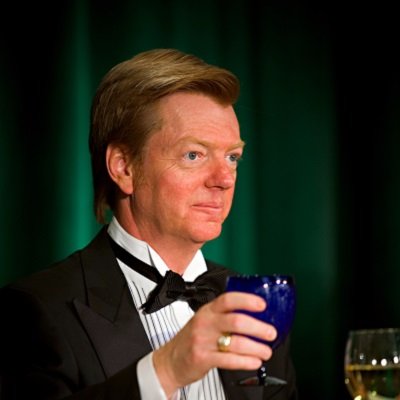
“J.T. the Brick was another very important piece of our lineup. He was on at night, and we could get a lot of clearance in much larger markets with his show,” Hobbs added.
The journey from making in-roads at night and on 1000 watt AM stations in towns like Farmington, New Mexico and Macon, Georgia to where FOX Sports Radio is now has clearly been a long and winding one. All of the network’s lineups have had their strong points, but it may never have been as strong top-to-bottom as it is right now.
“I’m happy with the lineup we see today, I wish I was a bigger part of it, but I’m proud to be part of what the product has become, from where it started out, to what it is now,” added Lincoln Kennedy, who has been with FSR since 2006 and is currently hosting weekend shows.
Bruno looks at his old network with a little bit of envy. Why wouldn’t he? It’s a a weekday lineup where no matter where a host is slotted, they’re surrounded by star talent.
“Don Martin and Scott Shapiro are both world class programmers and have it hitting on all cylinders now,” Bruno says. “I love those guys and respect what they have done with the brand.”
The only comparison for the murderer’s row of a daytime lineup FOX Sports Radio has is ESPN Radio in the early to mid 2000s. In 2004, the network added Colin Cowherd, and over the next few years, ESPN featured a star studded cast of talent that included Mike & Mike, Cowherd, Dan Patrick, Erik Kuselias, Doug Gottlieb, Sean Salisbury, Freddie Coleman, Chuck Wilson, John Seibel, and Jason Smith among others. According to Gottlieb, it’s pretty clear why people compare the two groups.
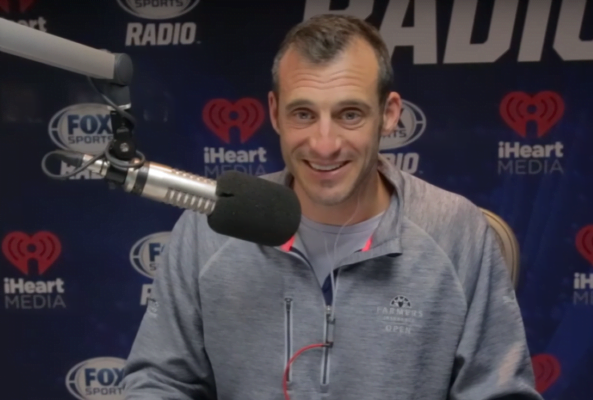
“Three in the lineup are the same so that has a lot to do with it,” Gottlieb points out. “Clay is very different for sports radio and compared to what Mike and Mike was, but both lineups offered a strong variety of shows throughout the day, and were embraced by listeners. People appreciate unique opinions and different styles of hosts rather than settling for common thought and too much of the same thing.”
CHANGING PERCEPTIONS
I made a different comparison in my conversation with Talbott. I think a lot of FOX and Premiere’s success begins with the understanding of how to market and sell top personalities on a national level. Nobody has done it better in news talk than Premiere. I asked Julie if she felt the perception of FOX Sports Radio has improved, and if FSR now has the same gravitas in the sports format that Premiere commands in news/talk.
“Absolutely!” she says. “Our focus has been on bringing the biggest names to Fox Sports Radio. It’s been one of our top priorities. Changing perception is difficult even when the product should speak for itself. It’s Premiere’s responsibility to tell our advertising community and our affiliate base that Fox Sports Radio has invested in itself, and the results are there. Just give us a listen. That’s the proof in the pudding.”
Though the talent, content, leadership, and togetherness are important, that isn’t always enough to convince people to leave great situations. But Colin Cowherd did that in 2015, and while money, location, and a desire to be creatively challenged were key factors in his decision to leave ESPN, he raised another interesting point to Ryen Russillo on his podcast.
Cowherd pointed out that a lot of professionals don’t leave FOX, at least compared to other national sports media companies. He said it isn’t a mystery of why that is, explaining that he’s never had an easier work environment.
“They don’t micromanage me. I don’t feel the pressure from the corporate world. My bosses trust me. They know I work hard. When we started I said ‘Don’t look at ratings. Give this two and a half years, let it bake, and it’ll work’. They never questioned it. I trailed ESPN 26 to 1 when we started, and I’m now down to 2 to 1 in my slot. Even though I’m a member of FS1 and iHeartradio, it’s the best I’ve ever been treated, and the happiest I’ve ever been.”
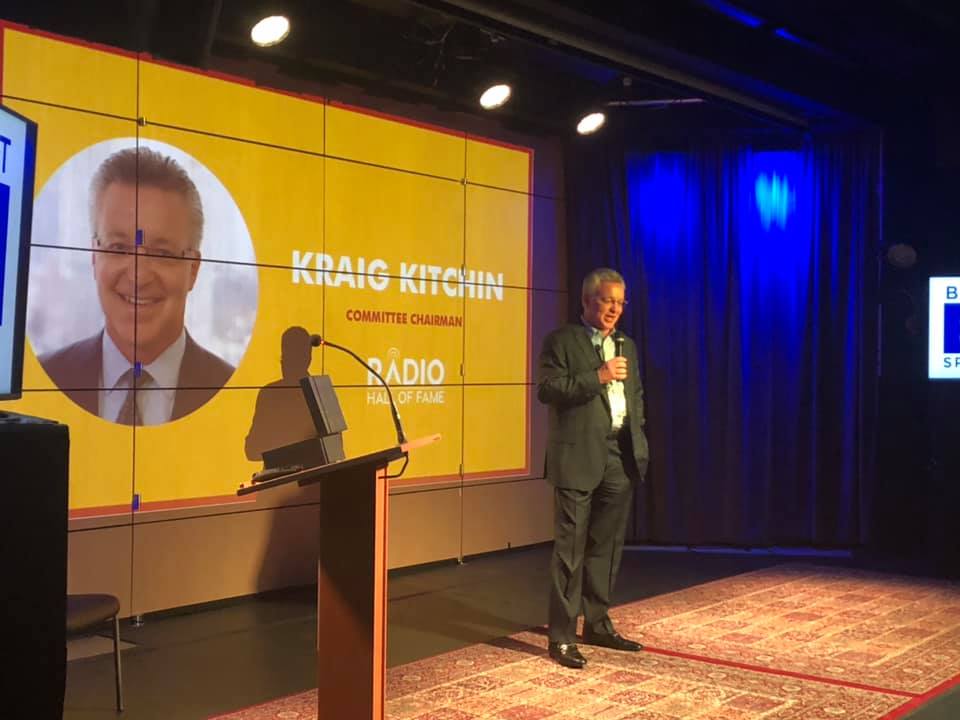
Kraig Kitchin has noticed a lot of similarities in the formula FOX Sports Radio used during his time at Premiere in the reasons that the network is excelling today. He calls the sound of the hosts “inviting to the listener” in that the camaraderie co-hosts share is palpable and opinions are not predictable. He labeled the audio elements “advanced” and swears by the information always being accurate.
FOX Sports Radio thrived during Kitchin’s years with the company thanks to talents like Rome, Bruno, JT The Brick, Steve Czaban, Andrew Siciliano, and others. He says they brought the same kinds of “declarative opinions that allowed the listener to carry away informed and determined opinions for themselves” that talents like Gottlieb, Cowherd and others provide today.
“Tom Lee, Annie Zidarevich, the late Andrew Ashwood, Scott Shapiro and Don Martin have been incredibly engaged and consistent curators of the sound of FOX Sports Radio. I’m proud to have done my small part at the beginning of the networks’ beginning,” Kitchin says.
TO THE NEXT 20 YEARS
FOX Sports Radio’s impact on the sports radio business deserves to be celebrated. Though competition persists throughout this industry, even the best of the best recognize when quality work has been done. To provide two decades of outstanding performance, and introduce the nation to countless superstar talent, while delivering results for hundreds of affiliate stations and advertising partners is no easy feat. It’s taken a lot of hard work, risk, change, and determination to reach this point, and listeners today would not have the benefit of enjoying the network’s personalities and content if not for the efforts of so many.
For De La Garza, the real reward is that the network has experienced the success it has had by sticking to his original vision.
“Fox Sports Radio Network debuted in August 2000 and 20 years later is still sticking to my original programming philosophy of ‘No Play-by-Play, just great entertaining Sports Talk’.”
“20 years in, and FOX Sports Radio has never been better,” said Eric Shanks, Chief Executive Officer and Executive Producer of FOX Sports. “We are proud of the unique voices that deliver the Same Game, New Attitude every day to millions of sports fans around America.”
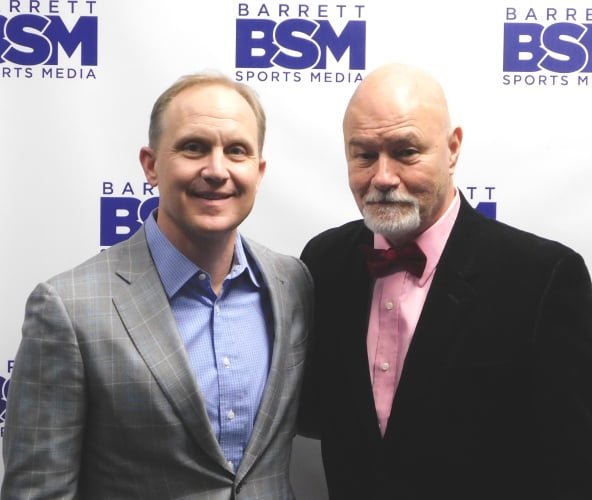
The list of executives, producers, board ops, imaging and voice talent who have helped grow the network is endless. So too are the talent, and though we’ll likely miss someone in this paragraph, and earn the social media wrath of a current or former host, producer, executive or listener on social media, try to be gentle. We did our best to recognize the numerous faces and voices who’ve been part of creating FOX Sports Radio’s two decades of excellence. If we accidentally forgot you, it doesn’t make your contributions any less important. That said, here are a bunch of the names who have played a role in entertaining listeners, delivering results for partners, and helping make FOX Sports Radio what it is today.
Tony Bruno, Jim Rome, Steve Czaban, Andrew Siciliano, JT The Brick, Dan Patrick, Colin Cowherd, Joy Taylor, Clay Travis, Doug Gottlieb, RJ Bell, Rob Parker, Chris Broussard, Jason Smith, Ben Maller, Jay Mohr, Rich Eisen, Rob Dibble, Stephen A. Smith, Chris Myers, Kevin Kiley, Chuck Booms, CJ Silas, Steve Hartman, Vic ‘The Brick’ Jacobs, Pat O’Brien, Petros & Money, Steve Gorman, Andy Roddick, Bryan Cox, Amy Van Dyken, Jason McIntyre, Van Earl Wright, Mike North, Andy Furman, Jay Glazer, Artrelle Hawkins, James Washington, Dan Sileo, Craig Shemon, Anthony Gargano, Tim Ryan, Sean Farnham, Bob Golic, Jack Trudeau, Dominic Zaccagnini, Mark Patrick, Jim Daniels, Steve Mason, John Ireland, Kevin Frazier, Mark Gubicza, Brady Quinn, Jonas Knox, Mike Hill, Mark Willard, Rich Ohrnberger, Brian Noe, Craig Wolfley, Tomm Looney, Eddie Garcia, Arnie Spanier, Kristine Leahy, Karen Kay, Turk Stevens, Krystal Fernandez, Jerome Jurenivich, Randy Kurdune, Deb Carson, David Gascon, Bernie Fratto, Larry Gifford, Nick Bahe, George Wrighster, Cuttino Mobley, Caron Butler, Bucky Brooks, Ephraim Salaam, Rob Ryan, Mike Harmon, Jason Martin, Rich Herrera, Tim Cates, TJ Houshmanzahdeh, LaVar Arrington, Will Blackmon, Ryan Field, Kirk Morrison, Jorge Sedano, John Fricke, Dan Moriarty, Aaron Torres, Rob ‘T-Man’ Tepper, Chris Plank, Dan Beyer, Nick Ashooh, Brady Poppinga, Isaac Lowenkron, Jeannie Zelasko, Seth Everett, Dave Palet, Jeff Dotseth, Bryan Fenley, Ted Sobel, Jeff Biggs, and Kevin Figgers.
On behalf of the entire crew at BSM, congratulations to FOX Sports Radio on its twenty year anniversary. We look forward to seeing what lies ahead for the next twenty years.
Jason Barrett and Brandon Contes also helped with research, writing, and interviews for this story.

Demetri Ravanos is a columnist and features writer for Barrett Media. He is also the creator of The Sports Podcast Festival, and a previous host on the Chewing Clock and Media Noise podcasts. He occasionally fills in on stations across the Carolinas in addition to hosting Panthers and College Football podcasts. His radio resume includes stops at WAVH and WZEW in Mobile, AL, WBPT in Birmingham, AL and WBBB, WPTK and WDNC in Raleigh, NC.
You can find him on Twitter @DemetriRavanos or reach him by email at DemetriTheGreek@gmail.com.




